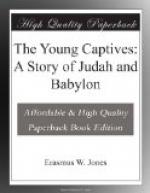“Permit thy unworthy servants once more,” said Azariah, “to acknowledge, with grateful hearts, thy kind regards for their beloved sister, whom thou hast taken as an inmate of thy hospitable mansion. Perreeza will always delight to do thy pleasure, and to be the obedient servant of thy amiable young daughter.”
“Your sister, while under my roof, shall not be looked upon in an inferior light. The chosen companion of my daughter will command due respect from those in high circles. The maid of Judah need not feel embarrassed, for her literary attainments will compare favorably with the most polished maidens of her own age in Babylon. She is not a captive. With the noble feeling of a sister’s heart, and of her own accord, she accompanied her brothers to a land of strangers. She is as free as any daughter of Chaldea; and therefore my Jupheena will be happy to introduce her to her friends in her real character, as a youthful maid of the royal line of Judah. In thus drawing a line of distinction between yourselves and your sister, far be it from me to think that your present relation to our government renders you, in any real sense, inferior to others—’tis but a name, and will soon be forgotten; for it is in the power of the king to elevate you, not only to proper citizenship, but to high rank and prominent stations in the government.
“Your sister will now accompany us home. Any article she wishes conveyed thither, shall be sent for without delay. Now, my daughter, are we ready?”
“All ready, father, unless Perreeza has aught unfinished.”
“I have naught to hinder,” answered Perreeza, with a trembling voice.
CHAPTER X.
In A royal apartment, decorated in superlative grandeur, sat the powerful monarch of Chaldea. He was alone. His countenance bespoke a degree of self-complacency and satisfaction. Around him, on a rich carpet, were several large scrolls of manuscript, while, in his hand, he held carelessly what appeared to be a well-arranged map of battle fields and grand points of attack. Chaldea, at this time, was the seat of science and learning. Thither the great of other nations resorted to acquire literary distinction. Nebuchadnezzar, from his childhood, had been initiated into all the arts and sciences; and, as he was a youth possessing a superior mind, he made great proficiency in all his numerous studies. Before he ascended the throne, he was pronounced to be one of the brightest scholars within the whole realm; and now, although a monarch, surrounded by a thousand cares and perplexities, he bestowed much thought on his own favorite studies; and one of his most prominent desires was the perpetuity and advancement of learning among his subjects. A dull individual, however high in his rank, could never share the company of the young King of Babylon. All who moved within the royal enclosures, whether as courtiers, under-officers, or domestics, had to be those of discerning minds and intelligence. What exact train of thought occupied the monarch’s mind at this time we may better judge, perhaps, from the sequel. He rose from his reclining posture and lightly touched a shining key, which instantly answered in a remote part of the royal palace. The door opened, and an officer bowed himself into the apartment.




